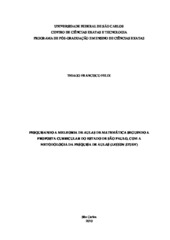Pesquisando a melhoria de aulas de matemática seguindo a proposta curricular do estado de São Paulo, com a metodologia da pesquisa de aulas (Lesson Study)
Abstract
This project is a study that seeks a reflection of author about classroom practices in teaching mathematics, at public schools of State of São Paulo, Brazil, especially with 6th and 7th grades of Basic School System. We adopted the Methodology of Lesson Study, a original Japanese Methodology, that focus the research on investigative activities of a teacher aiming at the improvement of his/her teaching practices. The phases of such investigative activities comprise the planning and the execution of the lessons, followed by the critical reflections after the lesson, that constitute fundamental steps to the search for the improvement of the teaching/learning process. This methodology is being disseminated in Western countries, and this work is one of the first adapted experiences as an attempt to introduce it in Brazil, and it is commented in Chapter 2. In order to secure an effective reflection of this process, we have established the investigative procedure at each stage of teacher´s practice, grounding the work on the concept of Pedagogical Content Knowledge (Schulman, 1986), discussed in Chapter 1. As main product of Master Program for Teachers, we have designed lessons and activities that consider the curriculum proposal of The Secretary of Education of the State of São Paulo and have followed the Methodology of Problem Solving of Polya, as a strategy to yield the analysis of lessons, activities and the following reflections. One main result sought and obtained in this work is the participative learning of students when building their own knowledge through the steps of Problem Solving Methodology, described in Chapter 3. In Chapter 5, we present some proposals for different types of lessons, describing the ways the curriculum recommendations can be worked out with our approach. We show analyses of lesson planning and the expectations of teacher about the executions of the plans at this stage, as well as about many problems come up with students´ difficulties, reactions and participations. Moreover, we comment the didactical perceptions of the author that have allowed conducting the Lesson Study in the stage of improving the learning with active participation of students. The most important achievement of this work is the execution of after class reflections mediated by Lesson Study Methodology, which has implicated a new vision of the assessment of students answers and questions/doubts. The work has permitted a more refined search and comprehension of the errors and the analyses of correct answers, which has brought a quality upgrade to the assessment. The Chapter 6 contains a synthesis of our reflections connected to the activities. The Appendix consists of detachable sheets with the lesson plans and steps of their execution, which can be used by basic school teachers as well as by students of teacher preparation programs who seek ideas and suggestions to improve their classroom practice.
